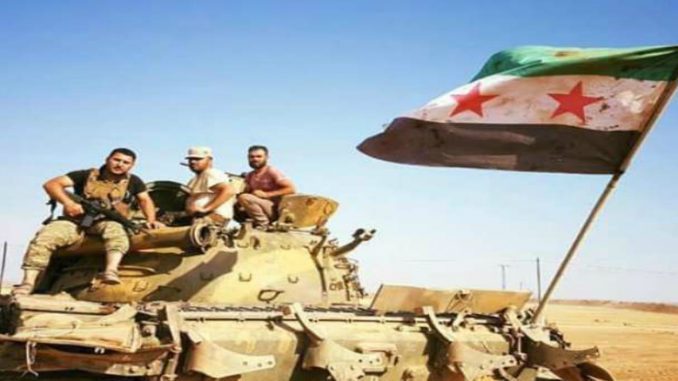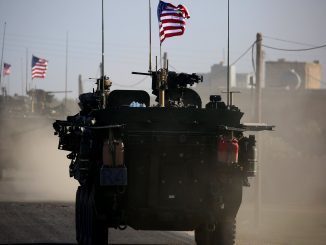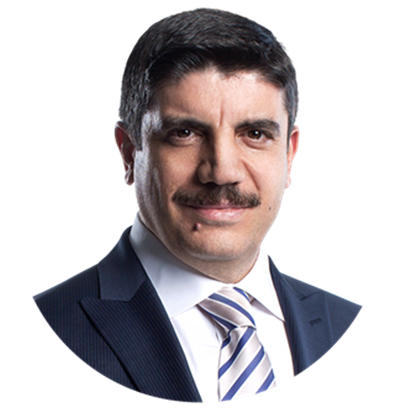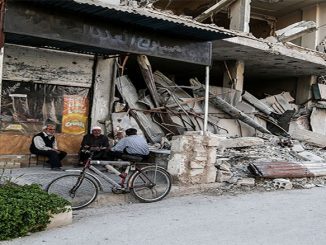
The US military aid to Syrian rebels in northern Syrian has been frozen since Jabhat Fatah al-Sham attacked them last month, casting doubts on Trump’s new policy towards Syria and his intentions regarding the conflict.
Idlib and nearby areas of Aleppo, Hama, and Latakia provinces are among the last strongholds of the rebels in western Syria. Many US-backed Free Syrian Army (FSA) groups have also operated there and nearby but radicals have also been a strong part in the military operations there. However,
However, it seems that the days of understanding have come to an end. Last month’s militant assault on the FSA groups was launched by Jabhat Fateh al-Sham, a group formerly known as the Nusra Front wich was al-Qaeda’s official affiliate in Syria.
This onslaught led several FSA groups to merge with the powerful Islamist faction Ahrar al-Sham, widely believed to be backed by Assad’s foreign adversaries in the region.
Rebel officials said that no official explanation had been given for the move this month following the jihadist assault, though several said they believed the main objective was to prevent arms and cash falling into Islamist militant hands. But they said they expected the aid freeze to be temporary.
Reuters confirmed the freeze with officials from five of the FSA groups that have been recipients of financial and military support from the so-called “MOM operations room”. It was also confirmed by two other senior FSA figures briefed on the matter.
They spoke on condition of anonymity given the covert nature of the CIA-backed program and the sensitivity of the subject.
The support funneled to vetted FSA factions has included contributions from Turkey, Qatar and Saudi Arabia – states that have opposed Assad. It is one of several foreign aid channels to rebels. Others still function.
Several rebels believed the aid halt was temporary, with new arrangements expected, but there was no clarity yet. Confirming the freeze, two senior FSA sources said donor states were aiming to send the aid to one, unified fighting force – a coherence that has eluded rebels throughout Syria’s civil war.
One of the FSA officials said he did not expect the rebels to be abandoned as they represent the best hope for blocking a further expansion of Sunni jihadist influence in Syria, and to fight back against the growing role of Iran there.
Arms getting to the radicals
The halt in assistance, which has included salaries, training, ammunition and in some cases guided anti-tank missiles, is a response to jihadist attacks and has nothing to do with U.S. President Donald Trump replacing Barack Obama in January, two U.S. officials familiar with the CIA-led program said.
“The reality is that you have changes in the area, and these changes inevitably have repercussions,” said an official with one of the affected FSA rebel groups. He said no military assistance could “enter at present until matters are organized. There is a new arrangement but nothing has crystallized yet”.
The CIA-backed program has regulated aid to the rebels after a period of unchecked support early in the war – especially from Gulf states – helped give rise to an array of insurgent groups, many of them strongly Islamist in ideology.
A similar program continues to operate in southern Syria with Jordanian backing. Some of the FSA groups backed through the MOM in the north continue to receive Turkish support as they participate in the Turkey-led Euphrates Shield offensive against IS and Kurdish groups to the northeast of Aleppo.
FSA groups have long complained that the aid provided falls far short of what they need to confront the better armed Syrian army. Their demands for anti-aircraft missiles have been consistently rebuffed.
U.S. intelligence and military officials said the leakage, sale and capture of U.S.-supplied and other weapons from units of the FSA to Islamic State, the Nusra Front, and other splinter militant groups have been a concern since the CIA and U.S. military began arming and training a limited number of rebels.
Trump’s policy
Before assuming office, Trump suggested he could end support for FSA groups and give priority to the fight against Islamic State (IS), whose well-armed jihadists hold large tracts of eastern and central Syria.
Trump has made it clear he has no desire to confront Russian President Vladimir Putin in Syria, and he has said America would have been in much better shape if it had done nothing to help Syria’s opposition.
Trump said in one presidential debate: “I don’t like Assad at all, but Assad is killing ISIS. Russia is killing ISIS and Iran is killing ISIS,” and stated that that regime change only causes more instability in the Middle East and while Assad is not exactly a welcome partner, shoring up his government is the best way to stem the extremism that has flourished in the chaos of the Syrian crisis.
But Trump’s administration has yet to declare a firm policy towards Syria and Iraq, despite his repeated vows to eradicate IS, so it has been “business as usual” with covert and overt training and military support programs, one U.S. official said.
Some Syrians see that the US haven’t given the Syrian opposition any support. On the contrary, it gave Assad a license to kill them, and this will not change now.
While Washington has provided significant support to the opposition, it has never matched the backing given to Assad by Russia and Iran.
President Barack Obama said the use of chemical weapons in Syria was a “red line” for him but then withered when Assad’s forces used sarin-filled shells to kill some 1,400 Syrians men, women, and children in 2013. America has armed and trained Syrian rebels, but only in small numbers. It never bombed Assad’s forces their behalf or established a no-fly zone where Syrian civilians might be safe from Syrian and Russian airstrikes.
“To the ones who fear of Trump’s upcoming moves, revise Obama’s policy and you will find no difference. Trump is just speaking without any political mask,” Faisal al-Kasem, a prominent Syrian journalist, has said.
The Syrian crisis began as a peaceful demonstration against the injustice in Syria. Assad regime used to fire power and violence against the civilians and led to armed resistance. 450.000 Syrians lost their lives in the past five years according to UN estimates, and more than 12 million have lost their homes.



